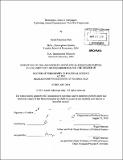Bankruptcy, guns or campaigns : explaining armed organizations' post-war trajectories
Author(s)
Daly, Sarah Zukerman
DownloadFull printable version (23.90Mb)
Other Contributors
Massachusetts Institute of Technology. Dept. of Political Science.
Advisor
Roger Petersen.
Terms of use
Metadata
Show full item recordAbstract
This project seeks to explain what happens to armed organizations after they sign peace accords. Why do they dissolve, return to war, or form non-violent socio-political entities (political parties or civic associations)? To explain variation in post-war outcomes, my argument centers on the human geography of armed groups. Recruitment, deployment, and post-war migration patterns generate distinct configurations of a) collective capacity, b) relations with civilians, and c) inter-armed group dynamics. I propose that, if a rebel or paramilitary unit recruits in a geographically concentrated area and deploys its fighters in their home communities, the organization will persist and transform into a socio-political entity after disarming. If instead the organization recruits in a dispersed manner, deploys its soldiers away from their towns of origin, and the soldiers either return home or displace to a third locale, the group will disintegrate; it will lose its capacity for collective action. By bankrupting some organizations and preserving others, demobilization has differential effects on armed group capacity. Where it weakens a group, it destabilizes the territorial bargains between the ex-armed group and state and between the group and its contiguous, non-state armed actors. As a result, resumed war becomes likely. If instead, the distribution of power within the system is maintained, the groups will, over time, fully demilitarize and be brought into the state's legal framework. This dissertation is based on rich data collected during fourteen months of fieldwork in Colombia from 2006 to the present during which time I went inside each demobilizing organization to reconstruct and map its postwar trajectory. Exploiting Colombia's unparalleled comparative laboratory for this research, I test the effect of recruitment, deployment, and post-war migration patterns on organizational outcomes using two strategies. First, I conduct a detailed, controlled comparison of armed groups in three regions of Colombia based on interviews of over 200 ex-combatants, civilians, and victims. The second strategy combines these qualitative sources with quantitative ones to evaluate the proposed hypotheses on the entire universe of municipality-armed group dyads in Colombia (n=1040). For this analysis, I rely on municipal-level violent event data, interviews of nearly 100 Colombian experts on the armed conflict, a database of seven years of news articles, and statistical evidence from a series of surveys of former paramilitaries (n=31,472). The empirics provide strong support for the proposed model. The project has significant implications for debates on reintegration, state-building, consolidating peace, reconciliation, decriminalization, and transitions to democracy.
Description
Thesis (Ph. D.)--Massachusetts Institute of Technology, Dept. of Political Science, 2011. Cataloged from PDF version of thesis. Includes bibliographical references (p. 304-328).
Date issued
2011Department
Massachusetts Institute of Technology. Department of Political SciencePublisher
Massachusetts Institute of Technology
Keywords
Political Science.